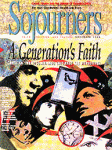Our faith has to be alive and light fires within our confused and fragile hearts or it is as meaningless as yesterday’s E-mail. We are the new church—"Generation X" label or not—and soon enough we will be the ones passing on a tradition that life is worth living, loving, and dying for. — Timothy Malone, 28
Generation X. 13th Generation. Twentysomething. Slacker. Whiner. Hopeless....Faithless?
What is radical faith for the emerging generation, and how does it manifest itself in our personal lives, in our jobs, with loved ones, in our churches, and in society? An ad hoc group of Sojourners staff members in their 20s came together to explore the spiritual-something of this new generation. We sought responses from a diverse body of twentysomethings who could offer a fresh outlook on theology, lifestyle, and vocation. Most submissions came from authors who have never written for us.
Seeking out new voices sometimes required finding unconventional conversation spots. In addition to faxes, letters, and phone calls, we discovered a niche on "Ecunet," a religious corner of the internet, where posting our invitation generated more than 200 responses. This on-line discussion gave excellent context to the forum we finally put together.
We often disagreed about what to include in the forum. Various experiences spoke more clearly to some of us than to others. But the joy of this format, we decided, was that there was space for difference. Faith manifests itself in our personal lives, in our jobs, and with our loved ones in ways as different as our genetic makeups and personality quirks.
We proceeded with caution about stereotyping, but recognized common events that shaped our perspectives. As children of the ’70s and ’80s, we are shaped by AIDS, increasing openness to gays and lesbians, the end of the Cold War, Reaganomics and cash machines, the Challenger disaster, the Crips and the Bloods, Earth Day and recycling bins, the Gulf war, and "We Are the World." These mold and shape us in ways comparable to how our parents and grandparents were molded by polio, McCarthyism, the world wars, the Depression, the Kennedy and King assassinations, the Civil Rights movement, the Cuban Missile Crisis, Vietnam, and "We Shall Overcome."
WHERE ADVANCES in technology once brought television and the beginning of the computer age, we now have MTV, CNN, and the Information Superhighway. Instead of Ozzie and Harriet or Ward and June, we were raised on single-mom Mrs. Partridge and the combined Brady family, reflecting the reality of divorce and the evolving acceptance of the many forms families can take.
Combining our own experiences with the pool of essays we received, we’ve sensed that the Gen-X religious experience is often a proactive search coupled with a pragmatism about radical faith. Vocationally, faith is lived out in a wide array of institutions, from the corporate world to the government and non-profit sectors, and not always standing with a picket sign at a protest.
On a personal level, radical faith can entail throwing trash in the right container, volunteering in a soup kitchen or a women’s shelter, or mentoring youth—all while owning the contradictions of our sinful complicity. A religious experience may manifest itself in a book, in a kitchen cutting garden vegetables, in a forest, or with a friend. It may occur with a kindred stranger, in a dream, in a song, or at a concert—and sometimes in a church.
Many of us often do feel dissonance and tension between generations. We hear the speeches, sign the petitions, read the materials, and work into the progressive Christian and secular institutions of the day. Questions arise—How do we fit in? Do we incorporate, fusing our energy and vision? Are we allowed? Are we trusted? Or should we do what our good founders did when they were in their 20s and start our own organizations? Can we afford to sacrifice wisdom, years of experience, and mentoring relationships for the opportunity to "do it our way"?
We want to learn but intend to be heard. Though we are confident of what we have to contribute, leadership is not disdained. The leadership we desire is open and mentoring, not top-down, distant, or self-justified. Instead of idolizing leadership or expecting superhuman perfection, honest companions and humble guides will do just fine. Any institution or organization with long-term vision must blend the voices and experiences of the emerging generation, if for no other reason than for its own survival. The future of the church depends on walking this road together.

Got something to say about what you're reading? We value your feedback!